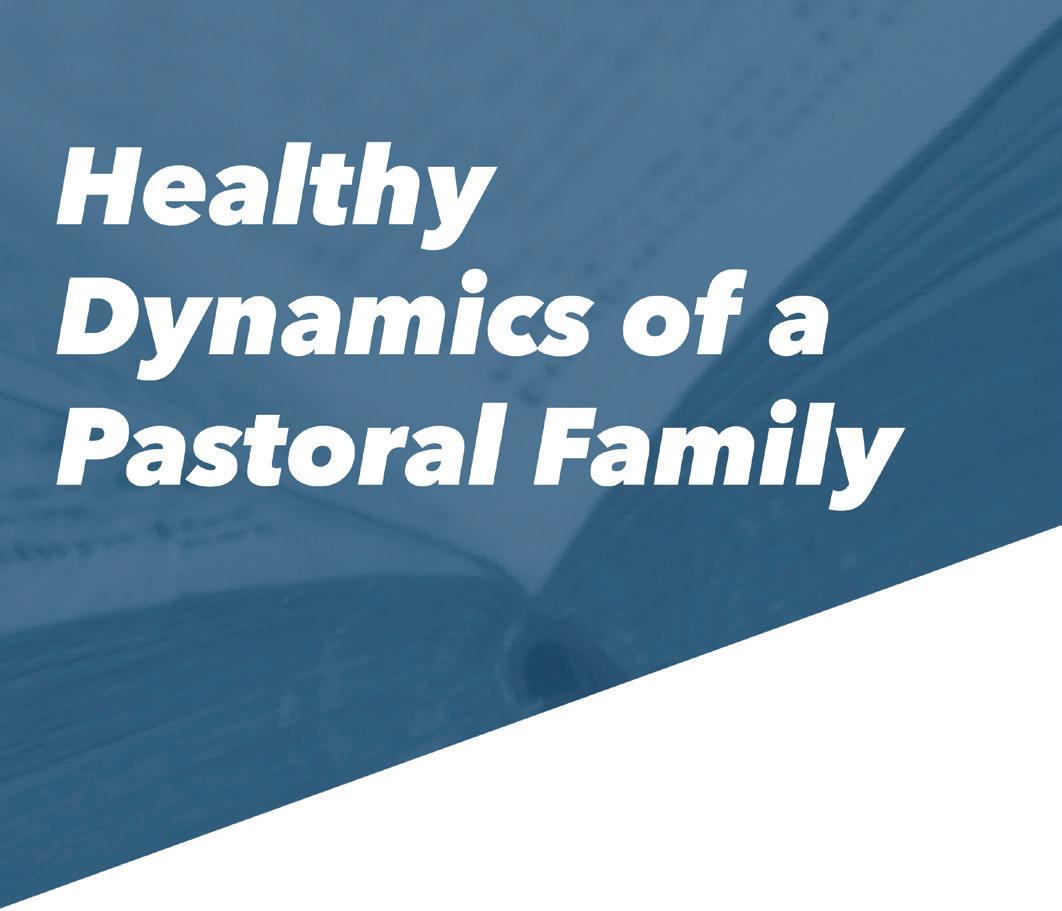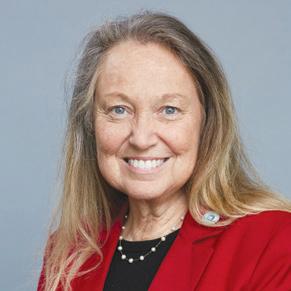
15 minute read
Evangelical Covenant Church Faces the Future
A COGOP Pastor Answers Questions
Starting and sustaining a new church in the urban context comes with challenges. While it certainly can be diffcult, we have realized that some of our most signifcant challenges are also our most incredible opportunities! Our Evangelical Covenant family has encountered many challenges as we seek to serve the Lord faithfully in Jersey City.
Ministry Challenges and Opportunities
For those who do not grow up in an urban context, one of the most signifcant obstacles is the pace of life. The high cost of living creates a greater work demand for the family. This results in people being busy, making it diffcult for families to commit to anything else. The “busyness” in today’s culture puts pressure on the church pastor and leadership team, especially when there seems to be a lack of interest in serving and committing to ministry. Many members let those “called” lead the work, not realizing that we all have been designed to serve God and people.
While this is undoubtedly challenging, it creates opportunities to better defne the local church's disciple-making process. Effective discipleship cannot take place at events people will not attend. One aspect of effective discipleship is building genuine relationships within the local church. As relationships are deepened, so is the awareness and removal of misconceptions of God’s ministry design for the church. Through these relationships, the church is equipped and mobilized to participate in incarnational ministry. How are we impacting the spaces we engage daily with the gospel? How are we applying God’s mission to every aspect of our lives? In what ways are we allowing the gospel to transform the neighborhoods where we live?
Jersey City is one of the leading, most diverse cities in America. We are diverse ethnically, economically, and geographically. The numerous neighborhoods within our city are shaped by the individuals living there. This makes ministry challenging! I experienced a deconstruction of ministry philosophy as I was commissioned out of an ethnic-based church to serve intentionally amongst this diverse population.
Reaching these diverse groups requires intentionality, but it is so worth it when you realize that this work mirrors the vision of God for the church in Revelation 6. The church is called to have the identity of Christ and lead the work of redemption in the city. Our local church vision is to make Jesus Christ known and his kingdom visible. Visibility of God’s kingdom is not restricted to a particular denomination, ethnic group, language, or socioeconomic status. There is space for everyone in the kingdom; therefore, our hearts burn passionately to see all people groups reconciled to God the Father.
One fnal challenge I would like to highlight is the great need existing within our city—a need that can make one feel hopeless and overwhelmed. Our city is growing and changing rapidly. Despite the advancements, our school systems still fall behind in quality resources; the rate of homelessness is high, crime still invades our streets, and our most vulnerable population—our children—suffers the most. Where sin abounds, grace abounds even more! We see abandoned and neglected neighborhoods being gentrifed, leaving emotional chaos and division among our people.
This creates opportunities for the church to demonstrate just how powerful the gospel is. In a city where hope seems lost, the gospel of Jesus Christ shines even brighter. God’s hand is seen when individuals are delivered from addictions, children are healed, families are restored, men are redirected to take ownership of their homes and communities, and the poor and marginalized are loved and valued. All these stories are part of the narrative of God using the church through the power of the Holy Spirit to complete the work of redemption.
Looking to the Future of the Church
The future of the COGOP looks bright because we belong to Jesus, the head of the church. On that note, our aim should be complete surrender to Jesus and his heart for the church and the world.
Jesus wants us committed to making disciples of all people groups. The Great Commission is centered on making disciples. In Matthew 28:19, Jesus gives us the layout of this mission—we are to make disciples of all nations which requires the church to aim for all four corners of the world. We make disciples by teaching them to observe [obey] what has been instructed by our Savior and incorporate them into the body of Christ through baptism. None of this is possible unless we preach the gospel under the Spirit’s infuence in an unadulterated form. Discipleship can start before conversion. Being in relationship with people in the city allows you to see the work of the Holy Spirit sprouting the seed of God’s Word even before a profession of faith takes place. The church must refocus on discipleship. After all, healthy churches are composed of disciples of Jesus.
Following the mandate of making disciples everywhere includes a strategic plan to increase our presence in the urban context. Cities are known for their constant movement and growing populations. Urban areas are developing in new regions all the time. The COGOP needs to commit to the city. Every major city in the world needs vibrant churches that sound and look like the people residing in them. Ethnic-based churches are essential, but that should not distract our movement from seeking to plant multi-ethnic, multilingual, and multi-generational churches worldwide.
Lastly, the current leadership must dedicate time and energy to mentoring the next generation. Local churches have struggled to successfully implement mentoring in the development of emergent leaders. If leaders receive any training, it usually comes from a Bible institute or other information-based seminar/ workshop. Some have pursued formal ministerial education through a seminary. However, mentorship has been a neglected topic for some time. If there is any organization that should be deeply committed to mentoring, it should be the local church because the mission of the church is to love God and to love people enough to see them live to God’s purpose for their life. 1 Mentees will be willing to step into future leadership roles and serve faithfully and confdently when mentoring emerging leaders becomes a priority in leadership development. Mentoring is the best way to establish an expanding and infuential ministry team to produce a dynamic and transformational church. It is a critical component of a healthy church and multiplies a leader’s impact. A pastor can reach fve; a team of well-trained leaders can reach ffty. Research has shown that mentoring is directly related to overwhelmingly predictive ministry outcomes such as speed of growth and church size.

Motivated to Reconcile the World to Christ
We are encouraging people to reconcile to the world by spending time with Jesus and adopting missional habits. The church is apostolic in its mission because we recognize that Jesus has sent us. He said, “Peace be with you. As the Father sent me, so I am sending you” (John 20:21 CEB). Wherever you are working, living, or visiting, you have been sent there by Jesus. A priority for those “sent out” is to pray and stay near to Jesus. We cannot share an experience that we do not have. The more time we spend with Jesus, the more we will look, feel, and sound like him. [Evangelism] often begins with our stories about God: how we experienced God, how we were changed by God, how God met us in our need. Our stories say to others that God isn’t just a distant idea. God is an immediate presence. As we tell stories from our spiritual journey, others start thinking about their experiences…. We need to have available multiple personal stories of the aliveness of God which we can draw on to pepper our conversation. 2
Prayer will always increase compassion and passion for the lost in our spaces. The Evangelical Covenant Church family has adopted the acronym B.L.E.S.S. as an initiative to reach and restore people, starting with those who are closest to us, yet who seem far from God. The B.L.E.S.S. initiative involves the following: Beginning with prayer, Listening with care, Eating together, Serving with love, and Sharing your story.3 By building relationships, sharing our stories, and loving others, we can continue the work of reconciling the world to Christ.
Managing Expectations and Boundaries
Reverend Aileen Reed, DMin
First Timothy 3:1–5 clearly defnes the biblical model for pastoral leadership in the home:
Here is a trustworthy saying: Whoever aspires to be an overseer desires a noble task. Now the overseer is to be above reproach, faithful to his wife, temperate, self-controlled, respectable, hospitable, able to teach, not given to drunkenness, not violent but gentle, not quarrelsome, not a lover of money. He must manage his own family well and see that his children obey him, and he must do so in a manner worthy of full respect. (If anyone does not know how to manage his own family, how can he take care of God’s church?) (NIV)
The pastor is responsible to be a faithful spouse, leader, and parent in the home out of reverence for Christ. Scripture makes it clear, if the minister does not hold spiritual authority over his family, the effectiveness of his leadership to the congregation will be compromised. The duality of role and responsibility as parent in the home and shepherd of the congregation can lead to relational pressures that cause discord in the home and cause the couple to be a “performing couple.” A "performing couple" is one that presents a perfect image to the congregation, while at the same time struggling on multiple fronts in the home without any help or guidance to walk them through their relational dysfunction. What resources does the family have available to them to handle problems such as brokenness, addictions, loss, and grief? Whereas the pastor is usually the one to walk other families in the congregation through these diffcult times, the pastoral family does not have a pastor of their own.
If pastoral couples are to produce children who are emotionally healthy disciples, they must have the freedom to parent their children without concern about the implication for their pastoral role. Nurturing Christian beliefs, morals, and values, and navigating family values when they are at odds with church values, can be diffcult when the pastor is ministering in a context where the church (culturally or philosophically) does not share the values that the pastor and spouse are trying to pass on to their children. For instance, because context often differs for missionaries and church planters, they may experience scenarios where their family values may be at odds with congregational or local values. In some instances, 1 Timothy 3:15 may be erroneously used by members or church leaders to criticize the pastor’s leadership of his home if his spouse or children do not meet the congregation’s expectations. Although the congregation can play a role as an extended family to provide additional support to the pastoral family, boundaries—just like in natural families—should be clearly articulated. Otherwise, church leaders or the congregation might develop unconscious, unrealistic, unspoken, or unagreed upon expectations of the family.

Members of the congregation might consciously or subconsciously have expectations for the pastoral family which may include the following:
• Behavioral standards for children—they must be perfectly behaved, or they are otherwise stereotyped as defant rebels.
• Children should be fully-for med disciples—their knowledge of the Bible should be greater than that of children their age because they are the pastor’s children.
• The minister’s spouse is to assume a particular role or ministry in the church, or not pursue employment outside the home.
• Family feels pressured to please, serve, perform, and be present with the congregation at all times.
• Pressure is on children to continue in a ministry career.
Expectations exist in every facet of life, and sometimes these expectations do not become clear until disappointment or confict arises. Thus, the key question that should be asked by the congregation is, what is a valid expectation? Valid expectations are as follows:
• Conscious: I am aware of my expectation.
• Realistic: This means there is evidence to support that the expectation is reasonable. Either it has been done in the past or the person has the capacity and willingness to do it.
• Spoken: I have expressed the expectation clearly.
• Agreed Upon: The other person has agreed to the expectation by saying “yes.”
Expectations should also be established by the family for themselves regarding how they will balance life and ministry. Communicating expectations is particularly important for families with adolescent children entering the pastorate for the frst time. As mentioned earlier, there will be a signifcant shift in the family’s dynamics. Therefore, the family should be in regular conversations at every stage—throughout a pastoral appointment/search process, prior to and after relocation, and at regular family check-ins. Singles who plan to enter the ministry and plan to get married should also clarify expectations during dating and prior to marriage. Consider how the ministry will impact the future spouse’s role in the church, the type of employment they can pursue, and expectations for how the home will be managed. Parameters should also be established between the pastor and the congregation regarding how the family is expected to function in the local church. When expectations have not been mutually agreed upon between the pastoral family and the congregation, boundaries become unclear.
Boundary Ambiguity
The quality of the pastoral family’s relationship with the congregation is critical to the health of both the family and the congregation. When there is congregational misft, tensions arise that can cause additional stress on the pastoral family and on the congregation as well. However, when there is a good ft, the congregation thrives. But even where there is a good ft, congregational demands or intrusiveness can become an additional pressure point in the family’s life. Boundary ambiguity, therefore, refers to the intrusiveness of congregational demands on the pastoral family. Typical intrusions that the pastoral family may experience include unannounced visits by members, family time interruptions by a phone call, an invasion of privacy by a member, or member criticism about the family’s childrearing or disciplinary practices, to name a few. Boundary ambiguity occurs when expectations between the congregation and pastoral family are not clarifed and formalized.
Five church dynamics that may intensify boundary ambiguity and intrusion include the following:
• The church may possess assumed expectations about the role of the pastor and the pastoral family.
• The church may view the parsonage as church property rather than a private residence.
• Church members often expect the pastoral family to have a different set of values than themselves.
• Individual members of the congregation project their set of family values or their faith beliefs upon the pastoral family.
• The pastoral family possesses an ethic of selfsacrifce that tolerates repeated instances of ambiguity or intrusion.
Boundaries are especially important with children in order to protect against emotional intrusions and imbalances of power between children and adults. For instance, a member of the congregation may publicly discipline or reprimand a pastor’s child because they are the pastor’s child and “should know better” but not hold their own or others’ children to the same standard. If boundaries are not clearly expressed and formalized, the congregation’s expectations of the pastoral family can become skewed, and the pastoral family might experience loss of privacy and diminished quality of life.
Time Demands
The pastorate is a 24 hours, seven days per week job, and the spouse and family may feel abandoned by a pastor who is always on the job. The pastor’s hours are often in the evening, nighttime, and weekends when weekly services are held and members are not working. However, these are also the same time periods that the family is available to spend time together. The demand for a pastor’s attention can come at inopportune times, such as during a family meal when an emergency arises at the church, or
Continue on page 31
The world we live in today is no longer the world we lived in 20 years ago. Actually, it’s no longer the world we lived in fve years ago. No, wait, it’s no longer the world we lived in last year. Or did I mean yesterday? It is so confusing—the times in which we live are easily defned as a post-Christian society. The church is no longer important; and in some respects, it is no longer important to the people it was important to a few years ago. The church is no longer relevant to people. For far too long, we have been answering questions nobody is asking, preaching sermons and teaching lessons that have no impact on the people who enter our sanctuaries. Everything you have just read should cause you to begin evaluating yourself, your church, and the church’s mission.
First, let us examine the truth about a postChristian society. Since it follows a Christian society, it means that there are still morals and values that exist within that society that were shaped by Christianity. An interesting fact about our post-Christian society today is that many who have left the Christian faith did not turn to any other faith. They simply became what is known as “nones.” “Nones” are individuals who do not identify with any particular religion or faith. However, even though they state they have no personal identity in a particular religion, what they have done is create their own worldview based on their own subset of information, thereby creating a religion of their own liking and worshiping their own desires. Yet, research shows they have not given up on God and a personal desire to worship something or someone. They believe in God, and they are even open to Jesus. Consider these recent fndings from Barna: “In an October 2022 Barna survey of 2,000 U.S. adults, three out of four (74%) say they want to grow spiritually. Additionally, the same proportion (77% a say they believe in a higher power. Nearly half (44%) say they are more open to God today than before the pandemic” (Kinnaman 2023). In addition, the Pew Research Center found that “among Americans overall, about seven-in-ten ‘nones’ believe in God or a higher power. That includes 86% of adults who describe their religion as nothing in particular and 46% of atheists and agnostics” (Mohamed et al., 2023). Knowing this, you still have reason to evangelize the world and reconcile the world to Christ because they are still searching for truth.
BISHOP RYAN NAPALO | MOOREVILLE, MISSISSIPPI

What happened to the church anyway? In simple terms, the church became secularized and shrouded by modern trends. We took on the identity of the world in order to appeal to people who were searching for truth. And, before you take that statement too far, there is absolutely nothing wrong with upgrading our churches, making them inviting, and using technology or a bit of fresh paint to share the gospel. We all have a high calling that demands excellence in everything we do; therefore, use whatever you can to reach the lost. Just don’t replace the power and presence of the Holy Spirit with whitewashed tombs: “Woe to you, scribes and Pharisees, hypocrites! For you are like whitewashed tombs, which outwardly appear beautiful, but within are full of dead people's bones and all uncleanness” (Matthew 23:27 ESV).
Current trends and preliminary research, however, are leading researchers to believe that after a post-Christian society, we will come to a post-secular society—another reminder for us to stay the course and not give up. There is a reconciliation that must happen, and you and I are called to GO. We can no longer remain in our churches with the mentality that the world will come to us when the Great Commission is calling us to go (Matthew 28:19–20).
So how do we overcome this? We desecularize the church. We traded our authenticity and anointing for a program, a routine, and a way the church down the street does it. We moved from church worship services to encounters and experiences, but we also traded titles to programs for the Spirit’s genuine presence with no encounter and no new experiences. Again, do not get me wrong. We needed some improvements in the way we did “church,” but we also needed to leave room on the program for the Holy Spirit to move instead of programing him out and leaving no time for him to move among us. And, yet I say to you, there is hope for the Church of God of Prophecy. God is doing a new thing among us.
The act of reconciling an account is a process that is used to prove that the transactions add up to the ending balance. Our call to reconcile the world to Christ is a call to the harvest—to go and bring the lost into God’s house. The churches of the Church of God of Prophecy have for far too long been behind. We have in some sense always been last to get on board to innovate and adapt to the world around us. As the church moves to de-secularize, we have one of the greatest advantages: We still believe in the Holy Spirit—the power (dunamis: [miraculous] power, might, strength), the anointing, the miraculous, the manifestation of his presence, and the operations of the gifts of the Spirit. So, while we shine up our churches, put on our best, and demonstrate the excellence of our ministries, let's open the door again and welcome the presence of the Holy Spirit.
I have stood at the pulpit of my current pastorate on at least three occasions and quoted an excerpt from Bishop A.J. Tomlinson’s “Thirteenth Annual Address” delivered in 1923: God was with Moses and directed the church in the wilderness. Jesus was with the apostles in the beginning of the gospel dispensation and started them out in the right way. But now we have the Holy Ghost to guide and direct us and to illuminate the sacred pages of our Lawbook [Bible]. He must have the pre-eminence. He must be recognized and honored in all our services and deliberations. Put Him out and we have nothing but machinery and buildings left. But we want to so conduct ourselves that He will be pleased to remain with us.
O, Thou heavenly dove, Thou hast been thrust aside and grieved—but we have been grieved too. Wilt Thou accept the place in our midst as instructor, guide and ruler according to all the divine plan of our Father God? We want Thee to have due honor, and, if Thou wilt only quicken us to service, we here and now renew our pledge of faithfulness to Thee. We want Thy presence; we want Thy wisdom to be displayed among us; we want Thy power
Continue on page 28
CATHY PAYNE, DMIN | GLOBAL MISSIONS MINISTRIES COORDINATOR












